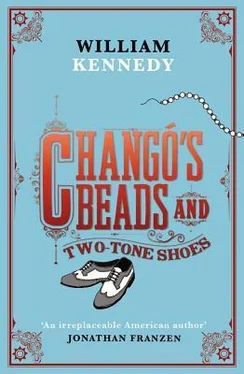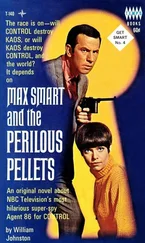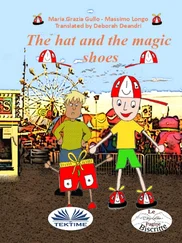“You right again, Bish,” Tremont said. “Goin’ public’s what I’m gonna do.”
Howie came down the bar to Tremont. “What’s that about shooting a politician? That some kind of joke?”
“No joke,” Tremont said. “Guy wanted me to shoot somebody.”
“In Albany?”
“Yeah.”
“Who?”
“Didn’t say who. Just had this idea.”
“Who you talkin’ about? What guy?”
“That guy out there on the sidewalk.”
“Which one?”
“Guy with the T-shirt,” and he pointed.
Howie looked out the window, then went down the bar and spoke to a waiter and went into the back room where the party was rocking with James Brown, getting bigger, and noisier.
“We better get you out of here,” Matt said. “You didn’t have to broadcast it.”
“Let’s have one for the road,” Tremont said.
“Too late. George and Vivian, you should come with us.”
“Give my regards to Broadway,” George said.
Matt ushered the three of them out the door and went directly to Roy who was haranguing the sidewalk gang to get inside, the Four Spot’s dangerous tonight if the town goes crazy. Cops been cruising with bullhorns telling people keep their kids indoors. Hanging out as a gang is asking them to bust your head, put you in jail. Nobody moved. Cops are all carrying shotguns tonight. You can’t cope with shotguns. Nobody moved. They won’t serve me inside, one said. We’re waitin’ for some guys, we ain’t makin’ trouble, what are you, a preacher?
“Roy,” Matt said and pulled him aside, “Tremont just told half the bar Zuki wanted him to shoot an Albany politician. I think the bartender called the cops.”
“Jesus, Tremont, is that true?”
“Wanted me to shoot the Mayor,” Tremont said, not in a whisper.
“Oh, fuck me, this can’t be real.” Roy turned to Zuki who heard what Tremont said and was already walking toward Clinton Avenue. “Hey, Zuki,” Roy said, “wait a minute.”
Zuki kept walking and, as Roy went double-time toward him, Zuki ran, but Roy was closing the gap as they turned the corner out of sight.
Matt turned to Tremont and said, “Let’s move on,” but then Roy came around the corner with Zuki in a hammerlock.
“Tremont,” Roy called out as he came, “is this the guy?”
“That’s Zuki.”
Two hefty white waiters and Howie the bartender, who was clutching a short baseball bat, came out of the bar. “Those two,” Howie said, pointing at Zuki and Roy, “and this one,” pointing at Tremont.
The black youths on the sidewalk backstepped away from the bar window. One waiter grabbed for Tremont but Matt moved his bulk between them and put his hand on the waiter’s chest. “Don’t touch him,” he said to the waiter and Howie.
The two waiters moved on Roy and broke his hammerlock on Zuki. Roy pushed himself away, off balance, and as one of them grappled with Zuki the other hit Roy with a roundhouse and jumped him when he staggered.
“Hey, leave that fella alone,” George yelled to the waiter struggling with Roy.
A black Chevy turned off Clinton Avenue onto Clinton Square, a one-block street. The driver slowed as two white men hanging out the front and back windows threw two Molotov cocktails into the crowd, the first smashing the Four Spot’s window. Zuki broke the grip of the waiter grappling with him and ran toward Clinton Avenue. The bomb ignited Howie’s apron and he dropped his bat, flailing at the flames. George picked up the bat and swung it against the skull of the waiter wrestling with Roy. The waiter fell to his knees and Roy backed into the street.
“I owe you for that,” Roy said to George.
“You done the same for me more than once,” George said.
The second Molotov had exploded against the stoop of the house next to the bar, splattering flame on the feet of the black youths and onto Vivian’s yellow shawl. Matt lifted it off her shoulder and shook out the fire. The Chevy had turned onto Orange Street, sped up Pearl and was gone. The two waiters and Howie went in to fight the fire inside the bar’s broken window.
With sirens screeching half a dozen police cars converged on the Palace Theater and Roy walked toward it, blotting his bleeding lip. He saw Ben Jones in front of the theater, hundreds of people coming out.
“We just got a call,” Ben said to him. “White kid either fell down the balcony stairs or went over a railing, some kind of fight during the movie. Kid may be dead. They say black kids did it.”
“Fuck,” Roy said. “Fuck, fuck, fuck.”
“That’s what I was thinkin’,” Ben said.
Tremont had crossed the street to watch the action, in no shape to fight tonight, Molotovs flyin’, whites are crazy. Tremont wanted a drink, but can’t go back to that place. Go to Dorsey’s. Matt had George and Vivian by the arms and was crossing from the bar to where Tremont was standing.
“We’re moving on, folks,” Matt said, and he hustled the trio across Clinton Square Park and onto Pearl.
“Maybe we can get a drink down at Dorsey’s on Broadway,” Tremont said.
“Lead the way,” Matt said, and they quickstepped down Orange Street toward Broadway as the wail of sirens grew louder.
“Too much goin’ on in that bar,” Tremont said.
“Too many loose wires in your machinery, Tremont,” Matt said.
“Why did you hit that man with the bat, George?” Vivian asked.
“Dick Hawkins was getting the worst of it.”
“That wasn’t Dick Hawkins,” Tremont said. “That was Roy Mason.”
“That was Dick Hawkins. I’ve known him all my life.”
“Whoever it was,” Matt said, “you got him out of trouble.”
“I thought it was exciting,” Vivian said. “I loved every minute.”
George sang:
“Just see the sweat poppin’ out of his brow,
I’ve got him right where I want him now.
Don’t you dare to talk back, ’bout the white ’bove the black,
I’ve got a white man working for me.”

A steward at the Fort Orange Club told Quinn the Mayor was expecting him and led him to a carpeted second-floor room away from the main dining room and bar traffic, and from members reading the papers and sipping whiskies in the parlors. The room was one of a dozen in the club used for intimate private dinners, oak-paneled with a small chandelier and wall sconces offering a marginally brighter light than might have been cast in this room eighty years earlier when the Club was founded. Two W. Dendy Sadler prints with scenes in the artist’s favorite nineteenth-century men’s club — men toasting a vintage wine, and men polishing golf clubs — brought back a bit of the distant elite past that both clubs had in common. The Mayor had been president of this club not long ago, and his grandfather was one of its founders and pillars. He entered the room with a brisk gait, wearing one of his gray single-breasted suits with white shirt and rep tie, his uniform.
“Mr. Quinn,” he said, and extended his hand.
“Mr. Mayor,” said Quinn, and he shook the hand.
Quinn had been watching Alex Fitzgibbon behave for three decades. Supremely articulate, expensively educated, immensely charming, he epitomized the suave politician for whom no hostile question would ever pose a problem. The answer, whatever the question, was that there is no ready answer, the situation is too complex, quite ambiguous, a matter of opinion, not what we expected, in need of study, can’t comment since it’s under investigation, sorry but I don’t have that answer, try again tomorrow. In the early 1940s his equivocal style was the understandable caution of a novice mayor, but he quickly shed the novitiate and raised vaporous improvisation to an elocutionary art form — graceful verbal effusion, devoid of specificity or meaning. I will tell you what I choose to tell you and nothing beyond.
Читать дальше













